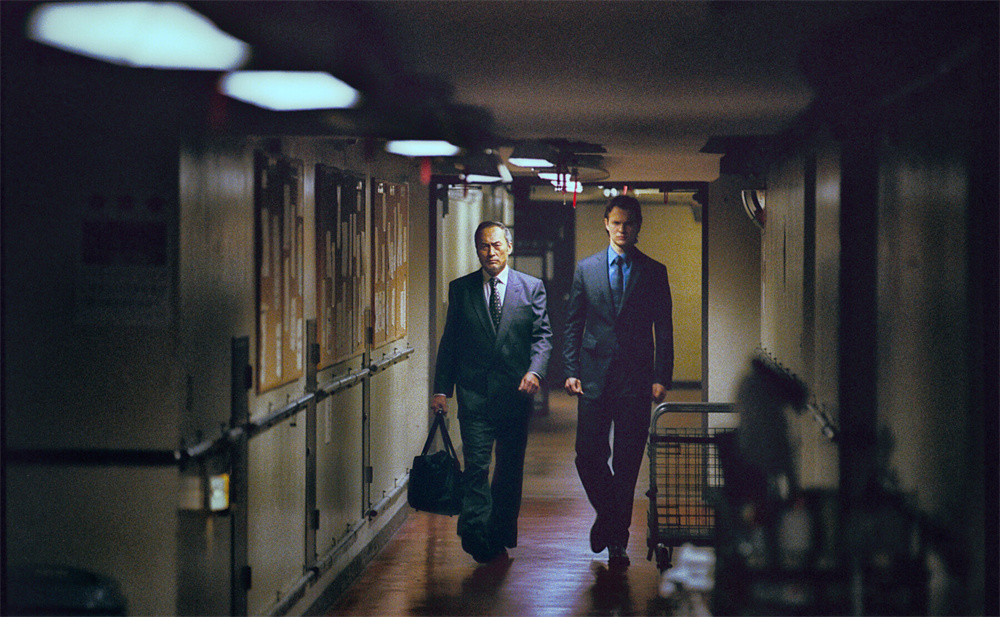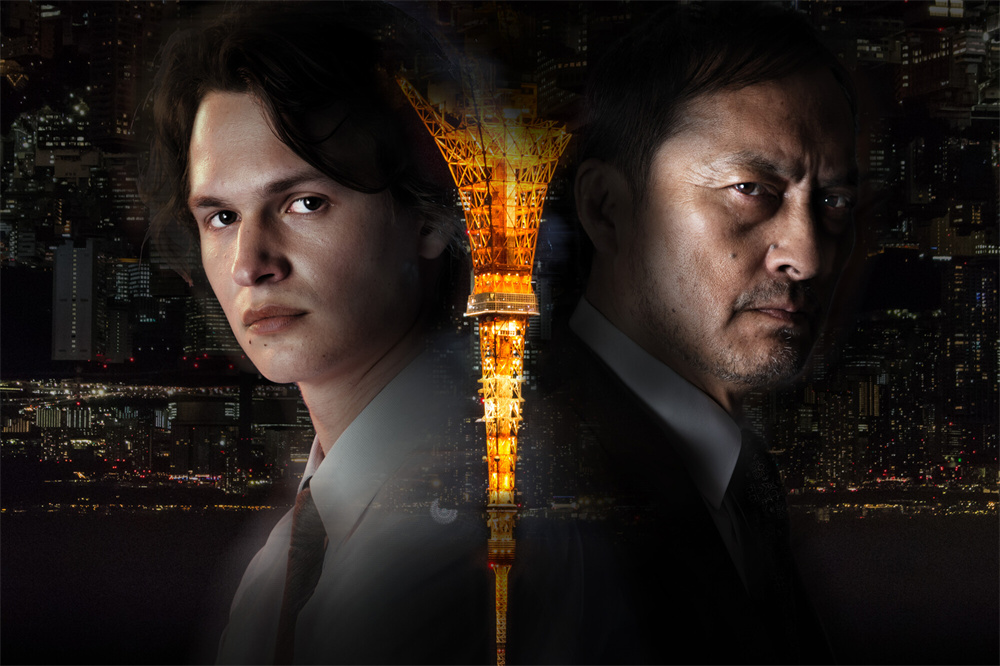This is a Japan rarely seen in Japanese film and television dramas, and foreigners and cultural observers will find it friendly. Anyone who has lived in Japan for a period of time, is very curious about this country, and wants to understand its national character and how society works, will always see such a Japan at a certain stage.
Michael Mann is back on the small screen to direct crime drama "Tokyo Vice," based on American journalist Jack Adelstein's eponymous nonfiction. Adelstein is a foreign correspondent for Japan's largest newspaper "Yomiuri Shimbun" (renamed "Meito Shimbun" in the play). After joining the job, he was assigned to the crime reporting team and plunged headlong into the world of "Yakuza" in the late 1990s.
The underworld of Yakuza is a mirror image of the world above, governed by stricter, more animalistic laws. Kasamatsu will play Sato, a member of the Tokyo local gangster Chihara Club. In his early years, he was fished out of the garbage pile at the bottom by his elder brother. After that, he wore a suit and tie and got rid of the fate of becoming garbage. Through him, we see the restless scene of the members in the reinforced steel frame of Yakuza. During the day, all the middle and lower-level members lived in one room, waiting boredly to be dispatched. Sato and another member who provoked him went to the rooftop to make an appointment. The long-lens tracked the potential energy of anticipation of violence. Everyone in the room filed out and climbed the spiral staircase to watch the battle.
In the era when the story takes place, the price of land in Japan has skyrocketed, Japanese companies have bought all over the world, and the "miracle" period of Japanese businessmen striding around the world has ended. In the early 1990s, when stock prices and land prices began to fall, several scandals involving financial institutions and gangsters such as the "Fuji Bank Illegal Financing Incident" and "Itoman Incident" broke out one after another, and the invisible hand of the yakuza surfaced. The organizational form that originated before the war and laid the foundation for Japan's post-war economic take-off will not be known until the bubble is completely burst.
Jack gradually discovered that the relationship between the police and the underworld is not a confrontation, but a symbiosis. Police officer Katagiri (played by Ken Watanabe) is in the anti-gang department, which mainly acts as a mediator of gang conflicts and a maintainer of the balance of power. That is to say, the violent establishment of the white road recognizes the power of the violent establishment of the underworld. As long as there are no large-scale violent incidents that arouse public unease, each other's wells and rivers will not be violated.
Curiosity brightened his eyes. From Jack's perspective, there is no Takeshi Kitano in the underworld, and no hot-blooded drama in the workplace. There was no breathing in the crowd of people in Tokyo shot from the top of the camera, and everyone was running for their lives. Jack with oriental eyes has a gentle personality. He is often teased in a friendly manner by fellow classmates, and foreigners Samantha (Rachel Keller) and Sato who work in the nightclub also love to tease him, and he always smiles. Of course, he also slyly played the rogue police officer Miyamoto (Ito Hideaki). The three visits to the Katagiri family were like a cultural observation class, showing the audience the secrets of building relationships in Japan.
The rich details depict the Japanese character in Jack's eyes. Some scenes must have impressed him deeply, such as Jack's superior, female editor Eimi Maruyama, making dinner at home while making work calls, and her husband sitting in the living room and urging loudly for dinner. The uncle, who had nowhere to go after owing usurious loans, deliberately chose to set himself on fire in public to save his widow from being sued by the landlord. After dying in this way, the underworld immediately stopped collecting debts, even though the debts were not paid, as if a dignified and heroic death had written off the debts. Katagiri led his troops to the Tozawa team to ask for heads, but one was not enough, but two more. With two eyes from the eldest brother of the Tozawa group, the two backers stood up one after another, bowing their heads to apologize.
In Japanese culture, an apology is often not about feeling sorry, but the lubricant that keeps the organization running, as important as "reading the air" (watching the words). Once Sato's eldest brother took him to a bar under the hood to comfort him. The Tozawa group, who came from Kansai, openly provoked the territory of the Chihara Society, and made a scene here. The bar owner tried to negotiate the price to reduce the protection fee. Sato slapped the owner and was taught by the elder brother when he went out. In what occasions and in what atmospheres you can do it, and when you need to be patient, these complicated rules are difficult to explain in words. The big brother really didn't make it clear. Just like the learning methods of various "Tao" in Japan, the only understandable part can be mastered only through the absolute majesty of the master and long-term imitation and study, and "reading the air" is the basic skill of entry.
Michael Mann is also good at "reading the air". The Metropolitan Police Department visited Tanaka Group leader Tanaka Renzhi (played by Sugata Jun), asking them to maintain peace during the visit of the heads of countries to Japan, and not to start a war with the Tozawa Group who are pressing step by step. Tea and towels are placed on the table, and the language of the camera is flowing. One after another, everyone served tea and released tea, like an impromptu band, and the information flowed in actions rather than words.
In the original book, Jack experienced everything he had to go through, passion, approach, struggle, helplessness, leaving, and finally turned into this book. Jack's one-time enemy is also later crushed by aging and social change, but national character and the way society works will not change so easily. He wrote about the Japanese underground society of Bystander Qing, leaving a fragment of history as he wished.
Michael Mann is back on the small screen to direct crime drama "Tokyo Vice," based on American journalist Jack Adelstein's eponymous nonfiction. Adelstein is a foreign correspondent for Japan's largest newspaper "Yomiuri Shimbun" (renamed "Meito Shimbun" in the play). After joining the job, he was assigned to the crime reporting team and plunged headlong into the world of "Yakuza" in the late 1990s.

Tokyo Sins poster
When the American Missouri Jew Jack Adelstein (Ansel Elgort) appeared, he was already a foreigner who was proficient in reading and writing Japanese and had been immersed in Tokyo for a long time. He sharpened his head and got into the low and crowded interior of the editorial office. He was shouted to and fro by the "Gaijin" (referring to foreigners) resounding throughout the space, and he volunteered to join Japan's hierarchical vertical society.The underworld of Yakuza is a mirror image of the world above, governed by stricter, more animalistic laws. Kasamatsu will play Sato, a member of the Tokyo local gangster Chihara Club. In his early years, he was fished out of the garbage pile at the bottom by his elder brother. After that, he wore a suit and tie and got rid of the fate of becoming garbage. Through him, we see the restless scene of the members in the reinforced steel frame of Yakuza. During the day, all the middle and lower-level members lived in one room, waiting boredly to be dispatched. Sato and another member who provoked him went to the rooftop to make an appointment. The long-lens tracked the potential energy of anticipation of violence. Everyone in the room filed out and climbed the spiral staircase to watch the battle.
In the era when the story takes place, the price of land in Japan has skyrocketed, Japanese companies have bought all over the world, and the "miracle" period of Japanese businessmen striding around the world has ended. In the early 1990s, when stock prices and land prices began to fall, several scandals involving financial institutions and gangsters such as the "Fuji Bank Illegal Financing Incident" and "Itoman Incident" broke out one after another, and the invisible hand of the yakuza surfaced. The organizational form that originated before the war and laid the foundation for Japan's post-war economic take-off will not be known until the bubble is completely burst.

"Tokyo Sin" stills
After entering the new millennium, the Japanese-style vertically integrated organizational structure has been left behind by the global integration of horizontal division of labor. Various characters in the play are still strictly obeying the old organizational structure. Jack's induction speech and editor Maruyama Yumi (Rinko Kikuchi)'s disillusionment asked him to devote his time and life to the organization from now on. At the end of the first episode, in the sworn/promotion ceremony of the Qianyuan Society, the members swear absolute allegiance to the boss. They are solemn and solemn. Who would have thought that they are only doing ancient business of collecting protection fees and lending usury.Jack gradually discovered that the relationship between the police and the underworld is not a confrontation, but a symbiosis. Police officer Katagiri (played by Ken Watanabe) is in the anti-gang department, which mainly acts as a mediator of gang conflicts and a maintainer of the balance of power. That is to say, the violent establishment of the white road recognizes the power of the violent establishment of the underworld. As long as there are no large-scale violent incidents that arouse public unease, each other's wells and rivers will not be violated.

"Tokyo Sin" stills
The protagonist, Jack Adelstein, was dubbed "half ape half Jew" behind his colleagues. The story takes place in the late 1990s, and although the bubble burst, the Japanese still remember the arrogance of catching up with the United States ten years ago. Jack is very cute. If such a character stays in the United States and realizes his ideals, he will become another stunned young man on the screen who is persistently pursuing the truth. In Japan as a foreigner, the situation is different. When Jack appears at the scene of murder, self-immolation, nightclub and gang conflict, in addition to journalistic ideals, there is also a strong curiosity to see the blood vessels under the skin of Tokyo.Curiosity brightened his eyes. From Jack's perspective, there is no Takeshi Kitano in the underworld, and no hot-blooded drama in the workplace. There was no breathing in the crowd of people in Tokyo shot from the top of the camera, and everyone was running for their lives. Jack with oriental eyes has a gentle personality. He is often teased in a friendly manner by fellow classmates, and foreigners Samantha (Rachel Keller) and Sato who work in the nightclub also love to tease him, and he always smiles. Of course, he also slyly played the rogue police officer Miyamoto (Ito Hideaki). The three visits to the Katagiri family were like a cultural observation class, showing the audience the secrets of building relationships in Japan.
The rich details depict the Japanese character in Jack's eyes. Some scenes must have impressed him deeply, such as Jack's superior, female editor Eimi Maruyama, making dinner at home while making work calls, and her husband sitting in the living room and urging loudly for dinner. The uncle, who had nowhere to go after owing usurious loans, deliberately chose to set himself on fire in public to save his widow from being sued by the landlord. After dying in this way, the underworld immediately stopped collecting debts, even though the debts were not paid, as if a dignified and heroic death had written off the debts. Katagiri led his troops to the Tozawa team to ask for heads, but one was not enough, but two more. With two eyes from the eldest brother of the Tozawa group, the two backers stood up one after another, bowing their heads to apologize.
In Japanese culture, an apology is often not about feeling sorry, but the lubricant that keeps the organization running, as important as "reading the air" (watching the words). Once Sato's eldest brother took him to a bar under the hood to comfort him. The Tozawa group, who came from Kansai, openly provoked the territory of the Chihara Society, and made a scene here. The bar owner tried to negotiate the price to reduce the protection fee. Sato slapped the owner and was taught by the elder brother when he went out. In what occasions and in what atmospheres you can do it, and when you need to be patient, these complicated rules are difficult to explain in words. The big brother really didn't make it clear. Just like the learning methods of various "Tao" in Japan, the only understandable part can be mastered only through the absolute majesty of the master and long-term imitation and study, and "reading the air" is the basic skill of entry.
Michael Mann is also good at "reading the air". The Metropolitan Police Department visited Tanaka Group leader Tanaka Renzhi (played by Sugata Jun), asking them to maintain peace during the visit of the heads of countries to Japan, and not to start a war with the Tozawa Group who are pressing step by step. Tea and towels are placed on the table, and the language of the camera is flowing. One after another, everyone served tea and released tea, like an impromptu band, and the information flowed in actions rather than words.
In the original book, Jack experienced everything he had to go through, passion, approach, struggle, helplessness, leaving, and finally turned into this book. Jack's one-time enemy is also later crushed by aging and social change, but national character and the way society works will not change so easily. He wrote about the Japanese underground society of Bystander Qing, leaving a fragment of history as he wished.

"Tokyo Sin" stills










Comments